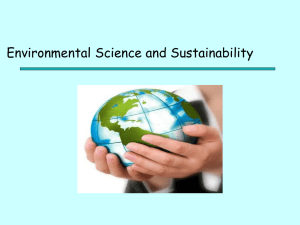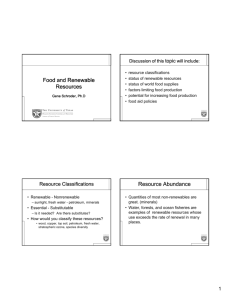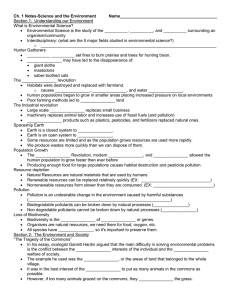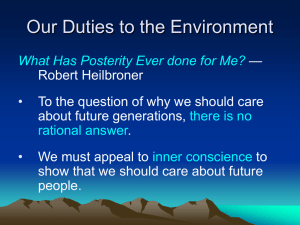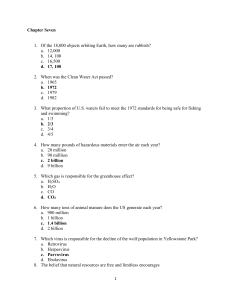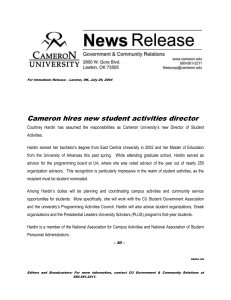Document 13409087
advertisement
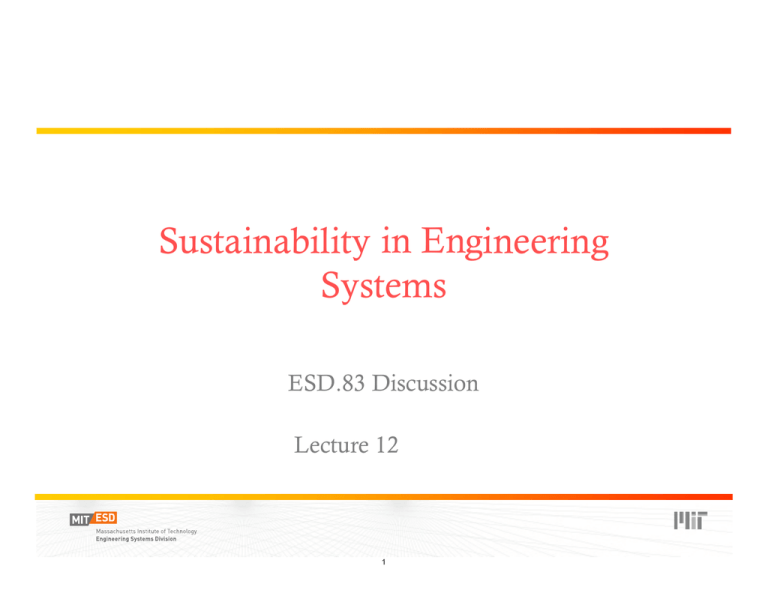
Sustainability y in Enggineeringg Systems ESD.83 Discussion Lecture 12 1 Outline Preliminary comments Hardin reading Biography and Major Works Tragedy of the Commons Banister Reading Biography and Major Works The Sustainable Mobility Paradigm Discussion 2 2 What is Sustainability? Table 1: Principles of Sustainable Transportation removed due to copyright restrictions. Original image can be viewed here (page 7): http://esd.mit.edu/symposium/pdfs/monograph/sustainability.pdf 3 3 Hardin,, The Tragedy g y off the Commons ((1968)) 4 4 Garrett Hardin (1915 (1915-2003) 2003) Degrees: B B.S., S Zoology Zoology, 1936, 1936 U. U Chicago Ph. D., Microbiology, 1941, Stanford Major focus of his career: human overpopulation One of the first members members of the Society for General Systems Research (now the International International Society for the Systems Sciences, isss.org) 5 5 Hardin’ss Major Works Hardin On Ethiopia: Living on a Lifeboat, BioScience magazine 1974 magazine, Summation of his works: Living within Limits, 1993. 1993. Natural sciences: grounded in limits Social sciences: things without limits This is the source of argument Last book: The Ostrich Factor: Our Population Myopia 1999 Myopia, Argues for coercive constraints on “unqualified reproductive rights” 6 6 The Tragedy of the Commons (1968) Premise: 1. There exists a class of problems without a purely purely technical solution. 2. One of these is the problem of overpopulation. Problem: P bl 1. The Earth has finite physical space and resources. 2. Individuals,, left to their own devices,, over-consume limited, shared resources. Solution: There should be some form of “mutual mutual coercion coercion”to to force individuals to take the actions that are beneficial for the aggregate (population control). 7 7 Courtesy of Tim De Chant, Per Square Mile (persquaremile.com). Used with permission. http://persquaremile.com/2011/01/18/if-the-worlds-population-lived-in-one-city/ 8 8 Banister,, The Sustainable MobilityyParadi gm 9 9 David Banister Banister, Biography Director of the Transport Studies Unit at Oxford Oxford Degrees: B B.A., A Geography, Geography Univ. Univ of Nottingham, 1971 Ph. D., Univ. of Leeds, 1975 This paper won the “Transport Policy Prize” for this paper, paper published in 2008 at the 12th World Conference on Transport R Research h 10 10 The Sustainable Mobility Paradigm Premise: Questions two common principles of transport planning. What are the necessary conditions for change? Problem: This is not a technical problem – the methods work. work How do we effectively promote public acceptability of sustainable transport measures? Solution Seven different methods (next slide) 11 11 Generating Public Acceptance 1. 2. 3. 4. 5. 6. 7. Provide the right information Include the public when discussing policy Provide the rigght p packaggingg “Sell” the benefits Implement radical changes slowly Work holistically Policies must m st be adapti adaptivee to the unknown nkno n future 12 12 Discussion 13 13 Authority and Information Moral vs. Political Authority There is a need to inform and educate the public concerning their actiions. As we know, people are irrational, biased, and do not consider all information. Questions: 1. Attacking Hardin’s position – is this truly a problem with no technical solution? Is there such a thing as net-zero existence? Now add one more person… 2. Is this a problem of information? Is educating the population the solution? What about the people that just don’t care, ever? 3. What about the “scientist who cried wolf?” Is this a role that the scientific community should play? 4 4. In a response, response Crowe Cro e described some of these issues as “value alue problems” and that the fragmentation of societies into tribes was destroying common values. Do you think that Banister’s ideas can overcome this? 14 14 Individuals Morality, Individuals, Morality and Decision Decision-making -making At the root of each lies the individual human being. Both Banister and Hardin believed that leggal architecture,,as supported by the majority, should “coerce” the unruly public. Questions: 5. A question of scale and scope: if this is truly a moral consideration id ti – that th t we mustt d do thi this for f the th sake k off mankind ki d – should be wait for the majority? Quis custodies ipsos custodes? 6. Can we afford the long view? What if our policies are solely to a ect soc affect social a aand d moral o a cchange? a ge? 7. Can we make moral judgments about future conditions of which we are not certain? (see Ehrlich, The Population Bomb in this same year) 8 Can we mak 8. ke systems rob bust to choi h ice?? Wh What would ld this hi llook k like? 15 15 Global thinking… thinking Going back to Selin: what to do about the third world? Q Questions: 9. Thresholds: what is the critical mass? In Mort Webster’s work, how do we account for the fact that X% of nations won’t agree to the standards? 10. Enforcement: 10 E f t if we enforce f rules l on the th Third Thi d World W ld that th t we did not follow at a similar point in our history, how do we answer critics? (see: China) 11.. Imperialism: pe a s : Iss itt our ou respo esponsibility s b ty to do so “for o their t e own ow good?” Are we then not politically and scientifically imperialist, and can you imagine the pushback that would occur? 16 16 Questions? 17 17 Revisiting Tragedy (Crowe, (Crowe 1969) Beryl Crowe wrote a response to Tragedy in 1969 (published in Science)). (p Points out the “two cultures” of natural and social sciences and references Snow. ponsibility yand protect “…Both sciences can thus avoid resp their respective myths of competence and relevance, while they avoid having to face the awful possibility that each has independently isolated the same subset of problems and given them different names… names ” Eroding the myths of Common Values the Monopoly of Coercive Force Force Administrators of the Commons 18 18 Revisiting Tragedy, Tragedy again (Oostrom, (Oostrom 1999) Points out the power of information: public goods games, etc. People are generally good at self-organizing, once they recognize the need yp of people: p Four types 1. 2. 3. 4. those who always behave in a narrow, self-interested manner (free-riders) those who are unwilling to cooperate with others unless assured that they will not be exploited by freeriders; those who are willing to initiate reciprocal cooperation in the hopes that others will return their trust perhap ps a few genuine altruists who alway ys try y to achieve higher returns for a group. The example of Nepalese Farming 19 19 Publications and Research Foci Foci: Publications: 1. Policy Scenario Building 2. Reducing the Need to Travel 3. Climate Change, Energy, and Environmental Modeling 4. Transport Investment and Economic Develop pment 5. Rural Transport and Employment 2010, 2010 Integrat t tedd Transport: from policy to practice 2007, Land Use and Transport Planning – European Perspectives on Integrated Policies 2005, Unsustainable Transport: city transport in the 21st Century 20 20 “Mutual Mutual Coercion Coercion” “The morality of an act is a function of the state of the sy ystem at the time it is performed.” “legislating temperance.” “Conscience is self-eliminating.” (Idiocracy, anyone?) ?) “Mutual coercion mutually agreed upon.” Coercion via social arrangements Compares his desired course to taxes and parking meters Very fatalist view; feels that “coercion” coercion and somewhat extreme measures are needed. Why not incorporate a rewards structure? 21 21 What is Sustainability? Merriam-Webster: 1. a. of, relating to, or being a method of harvesting or using a resource so that the resource is not depleted or permanently damaged; sustainable techniques or sustainable agriculture b. of or relating to a lifestyle involving the use of sustainable methods; sustainable society 22 22 MIT OpenCourseWare http://ocw.mit.edu ESD.83 Doctoral Seminar in Engineering Systems Fall 2011 For information about citing these materials or our Terms of Use, visit: http://ocw.mit.edu/terms. 23
